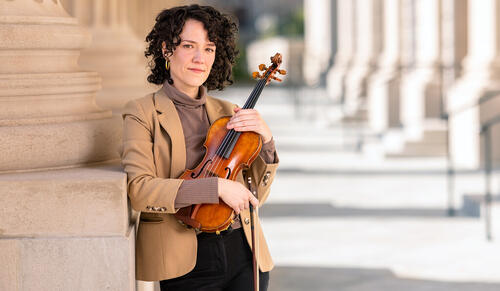
Office Hours with… Maiani da Silva
When she’s not performing contemporary classical works or teaching music to students, you might find violinist Maiani da Silva reading books about human behavior or listening to Motown giants like Stevie Wonder, Smokey Robinson, and The Supremes. The Brazilian-born da Silva admits that, if she’d been born at a different time, she would have loved to have performed some of the “lush” string parts in some of those legendary Motown cuts.
For now, however, da Silva is finding as much joy introducing Yale students to new music and serving as artist-in-residence at Morse College. Da Silva, who joined Yale’s Department of Music in the Faculty of Arts and Sciences in 2021, also performs solo and as a member of the four-time Grammy-winning ensemble Eighth Blackbird.
In the latest edition of “Office Hours,” a Q&A series that introduces newcomers to the Yale faculty to the broader community, she discusses what drew her to contemporary music and how one of her new projects is engaging questions pertaining to the climate crisis.
| Title | Lecturer in Music and artist-in-residence at Morse College |
|---|---|
| Research interest | Classical contemporary chamber music |
| Started at Yale | 2021 |
What are you teaching at Yale?
Maiani da Silva: I teach “Contemporary Chamber Music Performance” [MUS 238], a course that focuses on the performance and professional careers of musicians of our time. We do everything from playing music by Philip Glass, Viet Cuong, or Jessie Montgomery to arranging open-instrumentation works or pop songs, to workshopping and collaborating with Yale College composers on new works written specifically for the students of my course. We also invite guest artists to talk about their careers in music; we’ve been lucky to host artists like David Harrington of the Kronos Quartet, and Mikael Darmanie of Warp Trio. I’m always looking for new students to join in on the collaboration!
What inspired your interest in contemporary music?
da Silva: Being a violinist, which allows me the luxury of hundreds of years of solo and chamber repertoire, I found artistic agency in new music. This was something I desperately needed since for too long I felt immobilized by fears of not playing a piece the “right” way. In general, training in conservatory is such that there is very little time as a young student to really entertain what it is that you want to do with the music and why. When I first dipped my toes in contemporary music, I remember thinking, “There’s no recording!” That felt very intimidating. But at the same time, with new works you are encouraged to play differently from others: Within reason, there is no “right” way. I also found the composer-performer rapport fundamentally collaborative, which gave me another perspective on playing traditional repertoire — composers are just people, and how wonderful to be able to ask them a question and get an answer!
You believe your instrument can be a tool for addressing global challenges such as climate change. How so?
da Silva: With my new syncretic project Brouhaha, I am connecting composers with scholars in anthropology for engaging conversations that will inspire new commissioned multimedia works for me on solo violin. The pieces will be informed by the scholars’ knowledge, but also about philosophical questions pertaining to our role in the climate crisis, from a human-origins angle. For example, what role did creating tools play in our evolution, both biological and cultural? And what does that look like now? This project is an opportunity for interdisciplinary exchanges, which is where, I believe, there is enormous potential for addressing global challenges. As with new music, it’s not about having the answers, but having an opportunity to ask deeper questions, for its own sake.
Does your Brazilian heritage influence the music you choose to perform?
da Silva: To some degree, yes. A personal silver lining of the pandemic lockdown was that, in the midst of my sadness and confusion, I turned to the music that has consistently made me feel the most alive: Brazilian Popular Music (MPB). But it wasn’t enough to seek solace in just listening to it; I desperately needed to play it. I’ve since made a few arrangements of tunes by legends such as Milton Nascimento, Chico Buarque, as well as traditional work-songs (all with music videos). Since my training was not in jazz or Brazilian jazz, my approach is definitely that of a contemporary classical player, which is just so fun for me. I hope to incorporate these arrangements as encores, and ultimately record them for an album. It’s a love-project for the near future, but it’s out there now, so I’ll have to do it!